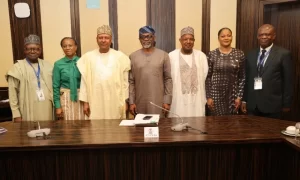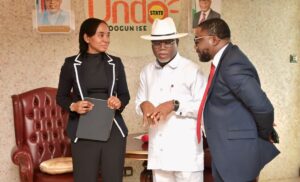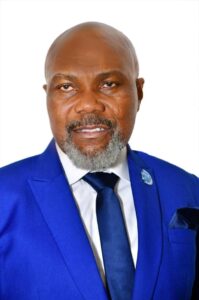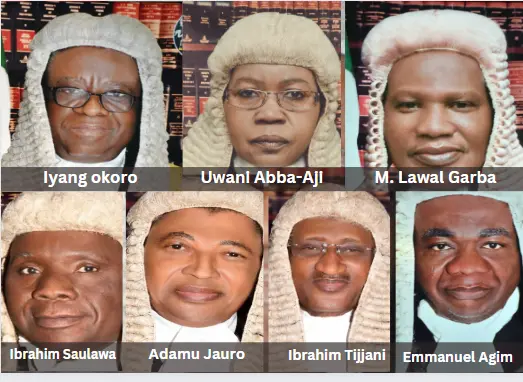
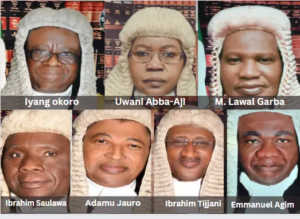
NIGERIA’S SUPREME COURT UPHOLDS TINUBU’S VICTORY, DISMISSES ATIKU, OBI ’S APPEALS FOR LACKING MERIT
All the seven member of Nigeria’s Supreme Court on Thursday upheld President Bola Ahmed Tinubu’s victory in the 2023 Presidential elections, dismissing the appeal filed by the candidate representing the People’s Democratic Party (PDP) in the elections, Alhaji Atiku Abubakar, and Labour Party candidate Peter Obi, for lacking in merit.
In a unanimous judgment, a 7-man panel of Justices led by Inyang Okoro upheld the judgment of the Presidential Election Petition Court which affirmed the election of President Tinubu.
In the notice of appeal, Atiku had urged the apex court to dismiss and set aside the September 6 judgment of the Presidential Election Petition Court, which affirmed the electoral victory of President Tinubu.
Justice Inyang Okoro, while reading the judgement, said, “On the whole, having resolved all the issues against the appellant, it is my view that there is no merit in the appeal and it is hereby dismissed.
“The judgment of the court below delivered on September 6th 2023 affirming the election of the second respondent as the duly elected President of the Federal Republic of Nigeria is hereby affirmed.”
The court ruled that Tinubu scored the majority of lawful votes cast and that Atiku did not produce alternative results of the presidential election that showed he won majority of lawful votes cast to dismiss the one declared by electoral body INEC.
The court also held that the outcome of the 2023 presidential election was unaffected by the Independent National Electoral Commission’s failure to post the election results on the INEC Result Viewing Portal in real time.
The Supreme Court also agreed with the Court of Appeal that the Federal Capital Territory is no different from the other states and failure to get 25% in the FCT makes no difference in the results.
The apex court dismissed the move by Atiku to allow the academic records obtained from the Chicago State University to be used as fresh evidence to establish forgery against President Tinubu.
Atiku, had in the motion filed on October 6, pleaded the apex court to grant him leave to bring in additional evidence by way of depositions under oath from the Chicago State University for use in his appeal.
The certified deposition was made by Caleb Westberg on behalf of Chicago State University on October 3, 2023, allegedly disclaiming the certificate presented by Bola Ahmed Tinubu to the Independent National Electoral Commission.
Ruling on the motion, Justice Inyang Okoro, held that out of the 7 issues brought by Atiku for determination, none related or covered forgery, which he is now seeking to bring in. He added that the Constitution does not permit that.
The apex court therefore held that it has no jurisdiction to grant the filing of fresh evidence that was not pleaded at the Presidential Election Petition Court which delivered its decision dismissing Atiku’s petition for lacking merit.
The Supreme Court further noted that Atiku did not even deem it fit to file for an amendment of his pleadings and for extension of time, since the 180 days allowed by the Constitution had elapsed since September 17, 2023.
Justice Okoro, who led the seven-member panel of justices, while reading the judgement, said, “The 180 days imposed for hearing of election petitions is immutable and cannot be extended.”
He went on to say “My noble lords, I have taken time to state the law on the issue to show the futility of this motion. It cannot be granted. The jurisdiction of this court is donated by the constitution and the electoral act regarding election petition appeals.
“…we cannot invoke section 22 of the supreme court act, since the lower court has since lost its jurisdiction. Moreso, there is no paragraph in the petition to accommodate a case of forgery.”
Regarding the INEC reuslts viewing portal also known as IRev, Justice Okoro said, “When IReV fails, it does not stop the collation of the results.”
While admitting that IReV not functioning will affect the trust of the electorates in the election, he said that the unavailability of IReV cannot be a ground for the election to be nullified.
He said, “The failure did not affect the outcome of the election. The issue is resolved against the appellants.“
The Supreme Court also agreed with the Court of Appeal that the Federal Capital Territory, Abuja, is no different from the other states and makes no difference in the results.
Justice Okoro asked, “Are you saying if someone scores 25% votes in 30 states but not in Abuja, he should not be president? Is that how you interpret the law?
“That is not the law. Supreme Court agrees with the Court of Appeal,” he added

